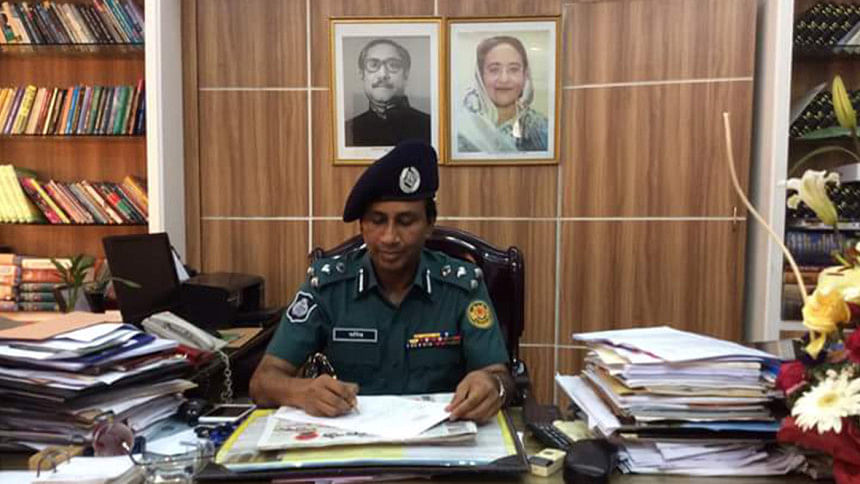JMB now regrouping with Salehin at helm

The mainstream JMB, which has been out of scene for quite a long time, is trying to regroup under a new chief.
Jama'atul Mujahideen Bangladesh (JMB), the banned militant outfit, issued a statement around two months back announcing Salauddin Ahmed alias Salehin as its ameer, said Monirul Islam, counterterrorism chief of DMP, yesterday.
The outfit is now managing funds through robberies, added the official.
The disclosure comes months after a JMB offshoot, “Neo JMB” as law enforcers call it, reportedly carried out two deadly terror attacks in Gulshan and Sholakia.
On February 23, 2014, Salehin and two other top militants -- Rakib Hasan Russell alias Hafez Mahmud and Jahidul Islam alias "Boma" Mizan -- were snatched away in a prison van ambush by militants in Trishal upazila of Mymensingh.
Salehin, who law enforcers believe used to shuttle between India and Bangladesh, narrowly escaped arrest when Kolkata police in a drive at a JMB hideout at bordering Bangaon in West Bengal arrested Trishal attack mastermind Anwar Hossain Faruq on September 25 this year.
Salehin, sentenced to death over the killing of a Christian youth in Jamalpur, was Sylhet-Mymensingh regional chief of JMB.
Law enforcers believe “Boma” Mizan, an explosives expert, is also hiding in India. Hafez Mahmud, Khulna divisional commander of JMB and condemned to death, has been killed in an operation.
“Operatives of JMB have recently carried out several robberies to collect funds,” Monirul told The Daily Star on the sidelines of a press briefing at the DMP Media Centre yesterday.
He referred to a recent robbery in Narsingdi following which four suspected JMB men were caught.
Local officials said the group committed robberies in seven to eight houses there. An agent of bKash (a money transfer service) was also robbed by them.
The militants looted cash and gold ornaments, they added.
Monirul said a good amount of the looted money was spent for legal fight to get the banned group's acting chief Abdullah Al-Tasnim Nahid out on bail. Tasnim along with his six accomplices were arrested on September 19, 2014.
Wishing anonymity, a top police official said that they became alert after being informed about JMB's attempt to get Tasnim released on bail.
Asked about the strength of the mainstream JMB, Monirul Islam said the banned group still has a good number of activists in Jamalpur, Mymensingh, Tangail and North Bengal region -- the areas known to be JMB strongholds.
Established by Shaykh Abdur Rahman in April 1998, the group started underground activities that year to establish Taliban-like rule through armed actions.
It, however, grabbed the limelight in April 2004 when it started vigilante operations against the ultra-left outlaws, popularly known as Sarbaharas, in Rajshahi, Natore, Naogaon and Bogra.
The JMB on August 17, 2005 struck terror across the country detonating 459 bombs in 63 out of the 64 districts almost simultaneously.
Since the execution of first JMB chief Abdur Rahman along with five top militants in 2007, the outfit tried to regroup under the leadership of some top militants.
JMB operatives, who became inactive after Saidur Rahman took over as the chief following Abdur Rahman's execution, formed a new group.
This offshoot, now called “Neo JMB”, emerged in 2014 after Islamic State burst onto the international scene. But it drew law enforcers' attention only after committing a grisly bank heist in Ashulia in April last year, leaving eight people dead, said police sources.
Investigators say the “Neo JMB”, which is inspired by IS ideologies, was responsible for the July 1 Gulshan café siege in which 20 hostages, including 17 foreigners, were killed.
The armed attack launched near the historic Sholakia Eidgah on the July 7 Eid day, leading to the death of two policemen, a housewife and a militant, is also an act of “Neo JMB”.
As Monirul's attention was drawn to the IS threat issued in Rumiyah magazine, he said militants do not have the capability to carry out any organised attacks here as most of their leaders have been either killed in operations or arrested.
“If they want to launch such attacks, they have to recruit members, train them up and have to manage firearms and explosives,” said Monirul, also an additional commissioner.
He, however, said there are still some concerns as any radical individual can carry out an attack.
Monirul mentioned that a good number of militants have been responding to the law enforcers' call to surrender after feeling that they chose the wrong path. He, however, would not disclose the identities of those who surrendered or their number.
Recently, “Neo JMB” distributed leaflets saying those who are surrendering would be considered kafir (nonbeliever) and murtad (apostate), he added.

 For all latest news, follow The Daily Star's Google News channel.
For all latest news, follow The Daily Star's Google News channel. 



Comments